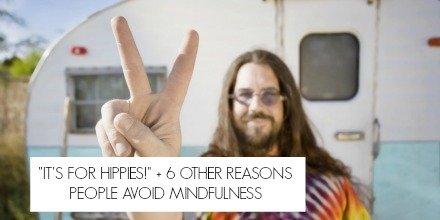
Imagine this:
You’re sitting in traffic. The sound of rain on the roof mingles with a cacophony of honking cars. You’re 10 minutes late for a doctor’s appointment; you can hear notifications on your phone beeping from your purse.
But instead of feeling stressed, overwhelmed, angry – you feel centered and calm. You watch the raindrops bead on the hood of your car and imagine your basil plant drinking up the rain. You’re thankful that you’re safe and dry inside your car.
Does that sound impossible? Finding a moment of zen in a nerve-wracking situation?
It’s not. When you tuck a mindfulness practice into your daily life, you’ll reap the benefits – particularly in situations like the one I just described. And maybe you know this already! Maybe you’ve read the studies. Maybe your best friend has raved about how meditation changed her life.
But for some reason, you just can’t make mindfulness happen. After working with hundreds of clients, I’ve heard every excuse under the sun and I’ve kindly, gently poked holes in all of them.
Here are the 7 most common excuses I hear – and why they don’t hold up.
“I don’t have time!”
Most of us associate mindfulness with meditation; we might imagine we need to meditate for 45 minutes a day to see results. But meditation doesn’t have to be prolonged to have significant effects – even five minutes a day makes a difference! You can literally meditate while you’re waiting for the car to warm up or the coffee to brew.
And if meditation isn’t your thing, here are 7 calming, centering things you can do that will bring mindfulness to your life.
“I don’t know how to do it.”
It can be intimidating to learn new things! But I promise, the learning curve for mindfulness is small . Even better, this is a not a skill that you need to practice in a public manner – this is not an ‘only adult in the learning-to-ski class’ situation. You can explore mindfulness privately, internally, on your own time, in your own home. This will help you get started.
“It seems religious.”
Many of people unconsciously associate mindfulness and meditation with Eastern religions. If you’re a devout Christian or Jew or Muslim, it can feel a bit inappropriate to partake in a seemingly religious activity outside of your own belief system.
Really and truly, mindfulness is a secular practice. It is simply the act of noticing and appreciating the present moment – something that all of us can benefit from.
“It’s hippie dippy.”
Do you imagine that the only people who practice mindfulness are 22-year-old yogis in California? Or maybe flakey, constantly late, marginally unemployed creative types?
Millions of people practice – and benefit from – mindfulness. Middle aged middle managers, suburban moms, urban teenagers. The only commonality that exists between mindfulness practitioners is that they want to be present in their daily lives. That’s it!
“It’s awkward!”
You’re allowed to practice mindfulness in a way that works for you. If you don’t want to, you don’t have to write mantras on your bathroom mirror or wear yoga pants or ever utter a single ‘om’. No one will ever know that you’re practicing mindfulness unless you tell them.
“It won’t work for me.”
Are you convinced that busy, buzzing mind of yours simply can’t be quieted? Or that you’re coping with the demands of your life pretty well without adding mindfulness to your plate? Russell Simmons, the famous hip-hop mogul, is a devout meditator. Comedian Russel Brand, billionaire investment banker Ray Dalio, Clint Eastwood, and New York Knicks president Phil Jackson all meditate.
If it works for them, maybe it’ll work for you?
“I’m already mindful.”
Maybe you are! But when I gently challenge my clients on this, what we usually discover is that they’re occasionally mindful, when the circumstances are perfectly aligned.
It’s easy to be mindful when you’re sitting on a park bench, surrounded by blooming daffodils, on a glorious spring day. It’s less easy while stuck in traffic, in the rain. Developing an intentional practice helps you strengthen those mindfulness muscles, so you can use them anytime you need them.
Do you recognize yourself in any of these excuses? If you do, be gentle with yourself – we’ve all been there!
If you feel ready to explore mindfulness, I invite you to read my free book Mindfulness Starts With You: 7 Daily Micro-Practices to Shift Your Experience. It’s just the thing to help you push past excuses and get started with your very own mindfulness practice.
Have you been struggling to get started or making a lot of excuses? Tell me about it in the comments and I’ll give you my best advice!




